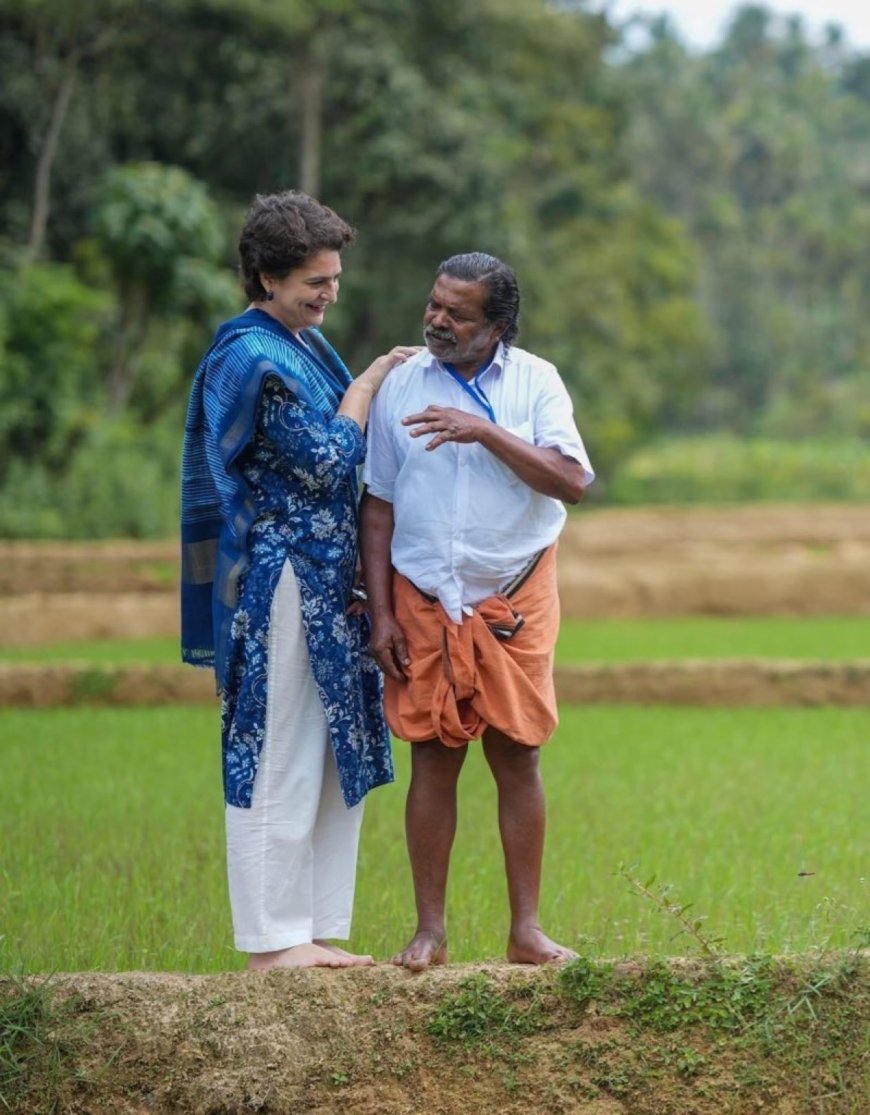Priyanka Gandhi Vadra Meets Padma Shri Tribal Farmer Cheruvayal Raman in Wayanad
Priyanka Gandhi meets Padma Shri farmer Cheruvayal Raman in Wayanad, honoring his seed conservation, tribal farming, and sustainability legacy.

Introduction
In a symbolic and heartfelt gesture, Congress leader Priyanka Gandhi Vadra recently met Padma Shri awardee and renowned tribal farmer Cheruvayal Raman in Wayanad. This meeting highlights not only political outreach but also recognition of grassroots efforts in sustainable farming and tribal welfare.
History & Background
Cheruvayal Raman, often referred to as the "living seed bank of Wayanad," is a tribal farmer who has preserved over 55 varieties of indigenous rice seeds in his ancestral fields. His contributions earned him the prestigious Padma Shri for his dedication to biodiversity conservation. Wayanad, being a constituency of Rahul Gandhi, also carries political significance, making this meeting more impactful.
Why the Meeting Took Place
Priyanka Gandhi’s visit was more than just a political stop. It symbolized:
-
A tribute to Raman’s relentless work in protecting traditional farming practices.
-
An attempt to connect with tribal communities and farmers in Kerala.
-
A way to highlight environmental sustainability and indigenous knowledge.
Benefits of the Meeting
-
Recognition of Tribal Farmers: Raman’s work got wider visibility through political acknowledgment.
-
Awareness on Sustainable Farming: It brought focus on seed preservation and organic farming practices.
-
Political Engagement: Strengthened rapport with local communities, especially in Wayanad.
Key Points
-
Priyanka Gandhi honored the Padma Shri awardee in person.
-
Raman has preserved indigenous rice seeds for decades.
-
The meeting highlighted the need for policies that support traditional farming.
-
Wayanad’s unique biodiversity was placed in the national spotlight.
Drawbacks
-
Some critics may dismiss it as political symbolism rather than genuine concern.
-
Without follow-up government action, such meetings may not bring real benefits to farmers.
-
Risks of overshadowing grassroots issues with political narratives.
Importance & Significance
This interaction is significant as it bridges traditional farming knowledge with modern political advocacy. It acknowledges the importance of climate-resilient agriculture and the need to protect biodiversity at a time when monocropping and industrial farming dominate.
Advantages
-
Encourages conservation of indigenous seeds.
-
Motivates younger generations to take pride in traditional practices.
-
Strengthens political focus on environmental sustainability.
Disadvantages
-
Limited impact if not backed by policy support.
-
Can be perceived as tokenism without long-term commitments.
Positive & Negative Aspects
-
Positive: Increased awareness, political attention to farmers’ issues, recognition of tribal contributions.
-
Negative: May remain symbolic without tangible outcomes for rural communities.
Final Thought & Conclusion
Priyanka Gandhi Vadra’s meeting with Cheruvayal Raman was not just a political gesture but also an acknowledgment of the priceless contributions of tribal farmers in preserving India’s agricultural heritage. While the symbolism is powerful, its real value lies in whether such engagements translate into sustainable policies, farmer welfare, and long-term support for indigenous farming practices. The event serves as a reminder that protecting nature, seeds, and culture is as crucial as modern development.

 Ellofacts
Ellofacts 





